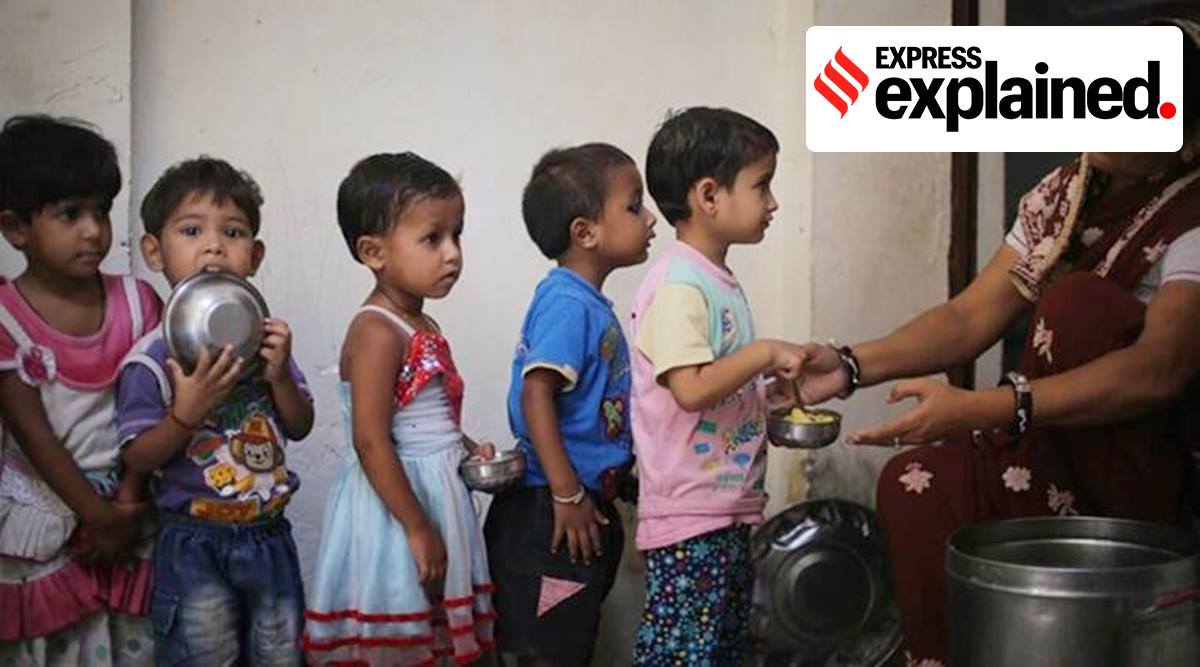
The Indian Express
Eggs or not: Why is Madhya Pradesh debating anganwadi meals again?
Madhya Pradesh is one of the worst affected states by malnourishment, with the state’s tribal population worst affected. The lockdown has disrupted various government schemes for providing nutrition.
by Iram SiddiqueAhead of bypolls in 27 seats, the BJP government in Madhya Pradesh finds itself walking a tightrope after Women and Child Welfare Minister Imarti Devi recently reiterated her proposal to provide eggs to children in anganwadis and pregnant women to fight malnourishment. Imarti Devi is one of the 22 Congress MLAs who had followed Jyotiraditya Scindia into the BJP, enabling the party to return to power in March this year.
How old is this proposal?
The proposal to provide eggs to children under the Supplement Nutrition Scheme (SNS) under the Integrated Child Development Scheme (ICDS) was first mooted in 2009. In 2015, it reached the Cabinet for discussion but was dismissed by the BJP government. That year, Chief Minister Chouhan famously said he would never let it happen while he remained CM.
When the Kamal Nath-led Congress government came to power in 2018, the proposal came up again. The proposal, from Imarti Devi, Women and Child Welfare Minister in the Congress government, got stuck due to financial concerns. The BJP opposed it again, with then Leader of Opposition Gopal Bhargav saying that if children are fed eggs from childhood, they might grow up to become cannibals. The proposal was planned for implementation from April 2020, but by then the Congress had lost power.
https://images.indianexpress.com/2020/08/1x1.png
When did the proposal come up again?
During an interaction with journalists in Gwalior, Imarti Devi was asked if she would raise her earlier proposal after having joined the BJP. She replied that she would indeed stick to her proposal to provide eggs to children and pregnant women, because eggs are high in nutrition. It would not be compulsory but only for those willing to eat eggs. For vegetarians, alternatives would be available in the form of milk and banana. “The health of children is important,” she told journalists, and added that she would discuss it with the Chief Minister. However, when contacted, she refused to comment about it.
How prevalent is malnourishment in Madhya Pradesh?
Madhya Pradesh is one of the worst affected states by malnourishment, with the state’s tribal population worst affected. According to the National Family Health Survey (NHF-4), at least 42% of children under age five are stunted while another 43% are underweight. Again, 26% are wasted (thin for their height) while 9% are severely wasted.
The lockdown has disrupted various government schemes for providing nutrition. A survey conducted by the NGO Vikas Samvad in 122 villages of six districts — Rewa, Satna, Panna, Umaria, Niwari and Shivpura — found that the nutrition intake dropped in children (by 51%), pregnant women (67%) and lactating mothers (68%). The majority of the residents in these villages were tribals and SCs.
Veena Shatrughna, retired deputy director of the National Institute of Nutrition, explained that eggs are a complete food that contain all nutrients except vitamin C. “For providing a wholesome meal for children, the right combination of various food including dal, rice, fruits and milk will have to be supplied in the right quantity if they are not given eggs,” she said.
Why is it a difficult decision for MP?
Over 40% of Madhya Pradesh’s population is vegetarian. The proposal has faced stiff opposition from various communities, notably the Jain community. In a post on social media, Jain community leaders have warned that only those parents who wished to have their children fed eggs should vote for Imarti Devi, who would be contesting from Dhabra constitutency in the upcoming bypolls.
How has the minister’s party reacted?
Following Imarti Devi’s statement, BJP chief spokesperson Deepak Vijayvargiya clarified that it was the minister’s personal view and the government would take into consideration the sentiments of all communities before taking any decision.
“We don’t want children to be divided along the lines of those who eat eggs and those who do not. We are opposing it as it is dividing children based on their eating habits,” he said. Food habits are a personal choice for people and the government cannot promote this through a scheme where eggs would be distributed in a public space and can be offensive to other communities, he said. “The Jain communities do not even eat onions; how is it acceptable to serve eggs then?” he said.
Asked about the proposal, Rajya Sabha MP Scindia said the matter is between Imarti Devi, who is the minister, and Shivraj Singh Chouhan who is the head of government. “It is for the government to decide,” he said. Chouhan has not made any statement on the minister’s proposal.
How many states provide eggs to children at anganwadi centres?
At least 14 states, including some ruled by the BJP, have so far been providing eggs as a part of the ICDS.
According to the National Baseline Survey of 2014, in nine of these 14 states — Telangana, Odisha, Andhra Pradesh, West Bengal, Jharkhand, Tamil Nadu, Bihar and Kerala — 95% of the population is non-vegetarian. In the remaining five states — Tripura, Karnataka, Jammu and Kashmir, Assam and Chhattisgarh — over 70% of the population is non-vegetarian.